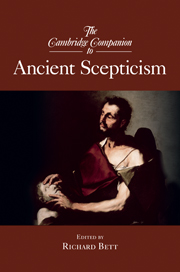Book contents
- Frontmatter
- Introduction
- Part I Origins and Development
- 1 Antecedents in early Greek philosophy
- 2 Pyrrho and early Pyrrhonism
- 3 Arcesilaus and Carneades
- 4 The sceptical Academy: decline and afterlife
- 5 Aenesidemus and the rebirth of Pyrrhonism
- 6 Sextus Empiricus
- Part II Topics and Problems
- Part III Beyond Antiquity
- Bibliography
- Index
- Index Locorum
6 - Sextus Empiricus
from Part I - Origins and Development
Published online by Cambridge University Press: 28 March 2010
- Frontmatter
- Introduction
- Part I Origins and Development
- 1 Antecedents in early Greek philosophy
- 2 Pyrrho and early Pyrrhonism
- 3 Arcesilaus and Carneades
- 4 The sceptical Academy: decline and afterlife
- 5 Aenesidemus and the rebirth of Pyrrhonism
- 6 Sextus Empiricus
- Part II Topics and Problems
- Part III Beyond Antiquity
- Bibliography
- Index
- Index Locorum
Summary
LIFE AND WORKS
Sextus Empiricus, who surely lived in the second and third centuries CE, is one of those rare Greek philosophers whose works we have more or less complete in the form in which he wrote them. Before the great commentaries and treatises of the Neo-Platonists at the end of antiquity, this is hardly the case except for Plato, Epictetus, Marcus Aurelius, and Plotinus. But should we place Sextus in such illustrious company? If his work had not been preserved, our knowledge of ancient scepticism would be much more limited; but, leaving aside the fact that he is an irreplaceable source, is Sextus “an obscure and unoriginal Hellenistic writer,” as Richard Popkin says? Or, on the contrary, did he introduce original elements into the philosophical debate of his time?
Of the life of Sextus Empiricus we know virtually nothing. We know that he was a doctor (he tells us himself, M 1.260, PH 2.238) and Diogenes Laertius lists him as the penultimate head of the sceptical school. It seems that Sextus wrote some works that are now lost. He refers to his own Medical Treatises (M 7.202); one wonders whether or not this is the same work as the Empiric Treatises cited in M 1.62. The other books of his that Sextus himself appears to cite are probably ways of referring to passages from the works that have survived. But that leaves us three works of his that seem (more or less) complete.
- Type
- Chapter
- Information
- The Cambridge Companion to Ancient Scepticism , pp. 120 - 142Publisher: Cambridge University PressPrint publication year: 2010
- 2
- Cited by

